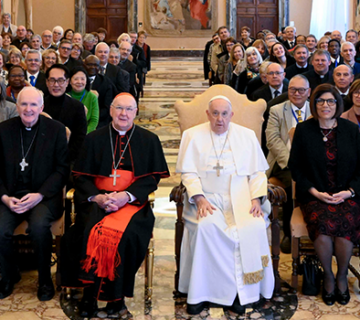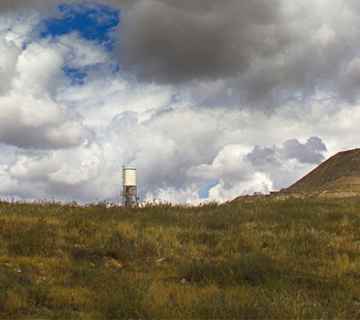 “ “We are few priests in the Czech Republic and it nearly impossible for two of us to live togerher, but when the priest who had married my parents became old I suggested that he come and live with me so that I could take care of him. The presence of an elderly person had an influence on the architecture of the vicarage and the church, in order to be more adapted to his needs. Shortly afterward he had a stroke and was in need of even more care. But if I had to say what was the most beautiful experience of my priesthood, it wouldn’t be so much the number of persons I saw convert, as much as this deep sharing of life.”
“ “We are few priests in the Czech Republic and it nearly impossible for two of us to live togerher, but when the priest who had married my parents became old I suggested that he come and live with me so that I could take care of him. The presence of an elderly person had an influence on the architecture of the vicarage and the church, in order to be more adapted to his needs. Shortly afterward he had a stroke and was in need of even more care. But if I had to say what was the most beautiful experience of my priesthood, it wouldn’t be so much the number of persons I saw convert, as much as this deep sharing of life.”
“After ten years of hard work as a priest I suffered a nervous breakdown. Then I was offered the possibility of living with one of my confreres. This was my salvation. I was able to continue helping in the parish and, little by little, I regained myself.” These are two of the testimonies that were offered during a group meeting for priests affliated with the Focolare Movement, on 24 May, during the conclusion of Maria Voce’s visit to Prague.
Life is not easy for priests in the Czech Republic. In a land which is 25% Catholic and 14 % practicing Catholics the number of priests is also very low and they normally have to care for more than one parish at the same time. The priests gathered at the Mariapolis Centre, most of whom have been living the spirituality of comunion since Communist times, never fail to underscore how sharing the joys and sufferings, fatigue and successes of their confreres was such a source of strength for them, even their salvation, as some remarked.
We do not fail to mention the Nuncio of Prague Archbishop Diego Causero, who visited and greeted the group: “I thank the priests who spoke. Two things pleased me in particular: the willingness to live with an elderly priest and the fervour with which you shared your life. Many of us are lacking this fervour; maybe we know many things, but we need to be passionate. This still happens among the focolarini and it gives energy, creativity, and provides an expansive force. The focolarini played an important role during the Communist years: I hope they will have that same force again now, because the Czech people are in need of leaders with a wealth of humanity, a capacity to enter into relationship. Let’s get working!
The discussion with Maria Voce and Giancarlo Faletti involved various topics such as: the novelty of the collective spirituality which the charism of unity brings; involvement in the local church; the inner-workings of the Movement; youth vocations. One priest asked: “In lands with a higher standard of living the number of vocation drops; vice versa, in places that are less rich, there are more vocations. Do you think there is a spiritual or social motivation for this?” “There are certainly social reasons, because in places where you find more economic opportunity, there are more distractions that can suffocate the voice of God. I don’t believe that there are less vocations, because God continues to call; but there are certainly fewer positive responses. However, even though youths are able to have all kinds of experiences, at times, it is precisely because of such experiences that they feel even deeper disatisfaction. Everything can be an occasion for God to make us feel something more. So I think that the spirtual side needs to receive more attention than the social side. Let’s be occupied with showing a powerful spirituality and that we are happy.
The contribution of priests turns out to be a determinant factor in the field of youth: it’s natural that they should be the reference point for youths. And great attention is being given by the Church to the new generations, everywhere in this country. There are active “Youth Centres” in the new diocese of the Republic, where a priest lives and works full-time, a family, and some youths. These are spiritual centres for organised groups and for travelers, the baptized, the unbaptized, and non-believers. Some three-thousand Czech youths will attend the upcoming WYD in Madrid. (They are) a hope or the Church and for the country.
By Aurora Nicosia


 Italiano
Italiano Español
Español Français
Français Português
Português


